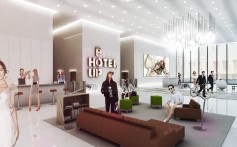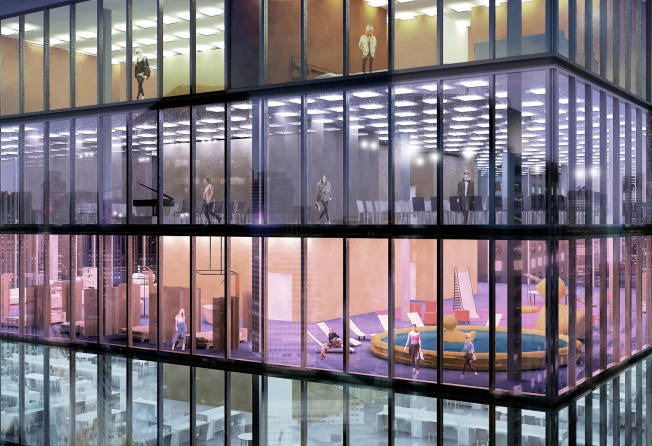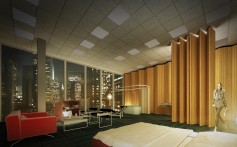
Pop-up hotels solution to problem of empty offices in New York, elsewhere
Four architects pioneer 'here today, gone tomorrow' accommodation in New York to help landlords cut their huge losses on unrented premises

Pop-up hotels may conjure images of luxury tents or specially designed containers brought in as site-specific, time-sensitive accommodation for transient crowds. Now, a group of four young architects are taking the concept one step further.
PinkCloud.dk is attempting to catch the tiger's tale of New York real estate with a plan to turn empty office space in Manhattan into "here today, gone tomorrow" hotels.
It is designed to help jolt American landlords out of a real estate malaise - unrented office space - that often equates to a monthly loss of millions of dollars, with mid-town occupancy languishing at 21.6 per cent, according to CBRE econometric advisers.
Add to that New York tourism rates hitting a record high of 52 million last year, according to Mayor Michael Bloomberg, and you see why PinkCloud.dk founders Eric Tan, Leon Lai, Fabian Busse and Nico Schlapps, have caused ripples.
"We saw the problem and needed to find a solution," said the Hong Kong-born, New York-bred Tan. PinkCloud.dk entered their idea in the Radical Innovation in Hospitality Competition and won a Grand Prize of US$10,000. All four flew to Las Vegas in May to collect the award.
A pop-up hotel has been something the four have talked about since they first met in 2010.
Tan, Berlin-based Schlapps and Lai - also from Hong Kong but who lives in Buenos Aires, Argentina - first met in Copenhagen at Danish architecture firm Henning Larsen. Busse, who lives in Braunschweig, Germany, joined the three later.

"New York landlords are typically quite conservative, but there is a compelling financial argument," said Tan. He does some quick numbers and trots out a monthly loss of US$2 million based on an average vacant 30,000 sq ft office building with rent of US$65 per sq ft.
The "radical" part has not deterred potential financiers from meeting the collective, nor are they scared of New York's outdated single-use-permit building laws. "It's a matter of finding the right building owner," said Tan, who wants to help push through revisions in the code.
PinkCloud.dk founders are adamant this could be viable in any city with low office occupancy rates.
Their pop-up-hotel idea would have a modular storage system contain furnishings and fixtures, much like Ikea's flat-pack system for shipping furniture. (Lai quickly added that they would love to chat with Ikea about designs for the hotel's furniture.) Box delivery would be tracked via a phone app and their progress updated in real time.
Each box would be labelled with a Radio Frequency Identification tag and be colour-coded to mark contents - orange for hotel items like beds, toilets and concierge area; green for dining; pink for entertainment (night club); and blue for amenities such as the gym.

Plumbing and electricity connections exist in office buildings whether vacant or occupied. Utilities just need to be turned on.
External pumps could be brought in to supplement water pressure if hotels span multiple floors of the building.
PinkCloud.dk 's vision is that each hotel would exist on several floors. Level one would have a check-in, lounge and possibly a boutique.
The second floor could house a gym, blow-up pool, nap area and a bar. Individual guest rooms would be located on the third level and the floor above that could contain event space.
PinkCloud.dk would issue guidelines for setting up the hotel, even though a standard layout does not exist because each office space would be unique.
Hotels could house as few as 20 beds in a low-density, high-square-footage luxury configuration, or as many as 200 beds in a high-density, low-square-footage, economy-style configuration.
Set-up of a pop-up hotel could take as little as six months, in comparison to four years for a traditional hotel developer. Building owners provide security and the hotel would provide staffing - a core permanent group and additional temporary employees as needed.
Tan said he and the others remained open about the future of the pop-up hotel.
"Should we pair with a hotel chain?" he asked. "Or with someone in the design world like Calvin Klein or Prada for Fashion Week?"
They are enthusiastic about creating a boutique hospitality experience around events like the Olympics or World Cup.
And the next great social ill PinkCloud.dk has targeted? Huge abandoned shopping malls.
"Everyone tends to buy stuff online," said Tan. "China has built the largest shopping centre in Dongguan, but the entire complex is vacant.
"We'd like to see what we can do as designers to solve the problem."
Greenhouses, botanical gardens, algae bio-fuel farms, even residences could be potential tenants for the unoccupied spaces, said Lai.